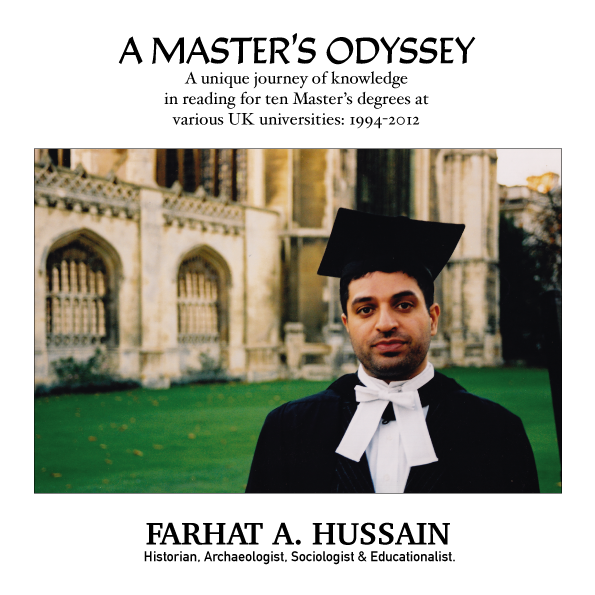
A Master’s Odyssey
Author: Farhat A. Hussain
H 210 mm x W 210 mm
Further details to follow
This concise edition of a larger study to be published in the future disseminates a unique journey of learning by the author in undertaking ten Master’s degrees in history, archaeology, historical landscapes, sociology, politics, educational studies and related subjects at various universities between 1994-2012. Established in their fields, some of the lecturers and supervisors of the author also at undergraduate level that is addressed at the start of this book, were (and remain) acknowledged in their field. Issues considered include aspects of the history and facilities of universities concerned, learning experience, studies and associated subjects such as city of the university, life, technology, travel, challenges, projects, interaction with EU students and those from other parts of the world and other phenomena, including travel to various parts of Europe and the wider world to the benefit of studies and research. Study and other advice is shared and insight provided of the author’s interest in the interaction of cultures and civilizations in history and the various projects that stem from the application of this subject, including their public and global scope and benefit. A pioneering and unique autobiographical and autoethnographic account of studying at a vast range of British universities during a period of considerable change in Higher Education that demonstrates and reflects on the impact of policy changes in HE at grass roots level. Of the latter, during the mid-1990s, the author received a signed copy of the famous Ruskin College Oxford speech of 18th October 1976 that commenced reform in British education from the late former Prime Minister, James Callaghan. Having studied and researched the history and sociology of universities, the author reveals similarities and differences across a substantive number of universities of different ages and organisational cultures. This is one of a number of issues that the author is asked of by students, potential students, lectures, researchers and senior management (including Vice-Chancellor level) across the UK and overseas as also professionals and officials, including Ambassadors, Members of Parliament of both houses, Ministers of State, members of ruling families, captains of industry, members of the armed forces, journalists and persons of many occupations, professions and backgrounds. The scope and benefits of this comprehensive range of studies in history, archaeology and related fields are also highlighted in this unique educational odyssey of and in British university history. Supported with photographs and other illustrations.